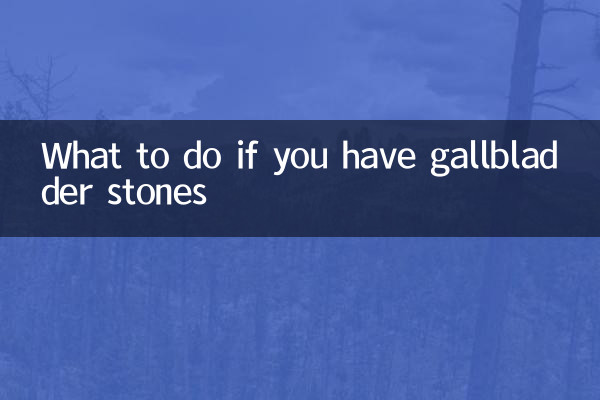What to do if you have gallbladder stones
Gallbladder stones are a common digestive system disease, and its incidence has gradually increased in recent years. This article will combine the hot topics and hot content on the Internet in the past 10 days to provide you with detailed answers to the causes, symptoms, diagnosis and treatment methods of gallbladder stones, and provide structured data for reference.
1. Causes of gallbladder stones

The formation of gallbladder stones is related to many factors, including the following:
| Cause | Specific instructions |
|---|---|
| dietary factors | A high-fat, high-cholesterol diet can easily lead to cholesterol oversaturation in bile |
| obesity | Increased cholesterol secretion in bile in obese people |
| Lose weight quickly | Rapid weight loss may lead to increased cholesterol concentrations in bile |
| diabetes | People with diabetes have higher levels of cholesterol in their bile |
| genetic factors | People with a family history are more likely to have the disease |
2. Common symptoms of gallbladder stones
Symptoms of gallbladder stones vary from person to person. Some people may have no symptoms, while others may experience significant discomfort. The following are common symptoms:
| symptom | describe |
|---|---|
| biliary colic | Severe pain in the right upper abdomen, which may radiate to the right shoulder and back |
| indigestion | Abdominal bloating, belching, nausea, etc. after meals |
| jaundice | Yellowing of the skin and whites of the eyes may indicate bile duct obstruction |
| fever | Possible gallbladder infection |
| fat intolerance | Symptoms worsen after eating greasy food |
3. Diagnostic methods of gallbladder stones
If you suspect that you have gallbladder stones, you should seek professional medical examination promptly. Common diagnostic methods include:
| Check method | advantage | limitation |
|---|---|---|
| abdominal ultrasound | Non-invasive, economical and highly accurate | May be limiting in obese patients |
| CT scan | Assessable complications | Low detection rate for cholesterol stones |
| MRCP | Non-invasive assessment of the biliary system | higher cost |
| blood test | Assess liver function and inflammation indicators | Not very specific |
4. Treatment options for gallbladder stones
The treatment of gallbladder stones should be individualized according to the patient's specific situation. Main treatments include:
| Treatment | Applicable situations | Advantages and Disadvantages |
|---|---|---|
| Watch and wait | asymptomatic patients | No treatment required, but there is a risk of seizures |
| Medicinal stone dissolution | Cholesterol stones, diameter <1cm | No surgery required, but long course of treatment has high recurrence rate |
| extracorporeal shock wave lithotripsy | Dissolve stone with medicine | Less invasive, but limited application |
| laparoscopic cholecystectomy | symptomatic patients | Minimally invasive, quick recovery, requires general anesthesia |
| laparotomy | complex cases | Big trauma, slow recovery |
5. Lifestyle suggestions for preventing gallbladder stones
Prevention is better than cure, here are some lifestyle tips to help prevent gallbladder stones:
1.balanced diet: Reduce the intake of high-fat and high-cholesterol foods and increase dietary fiber
2.control weight: Maintain a healthy weight and avoid rapid weight loss
3.regular exercise: At least 150 minutes of moderate-intensity exercise per week
4.Eat small meals more often:Avoid prolonged fasting
5.Drink plenty of water: Keep the daily water intake at 1.5-2 liters
6. Frequently Asked Questions
Q: Will digestive function be affected after cholecystectomy?
A: There may be fat indigestion in the short term after cholecystectomy, but most patients can return to normal digestive function after an adaptation period of 3-6 months.
Q: Can gallbladder stones become cancerous?
A: The long-term presence of gallbladder stones may indeed increase the risk of gallbladder cancer, especially when the diameter of the stones is greater than 3cm or when the gallbladder wall is thickened, the risk is higher.
Q: Can Chinese medicine treat gallbladder stones?
A: Traditional Chinese medicine has a certain effect in relieving symptoms, but its effect on larger stones is limited. It is recommended to combine it with modern medical treatment methods.
In short, although gallbladder stones are common, there is no need to panic. With scientific diagnosis and treatment, most patients can achieve a good prognosis. If you have relevant symptoms, it is recommended to seek medical treatment in time, and a professional doctor will evaluate and formulate the most suitable treatment plan for you.

check the details

check the details